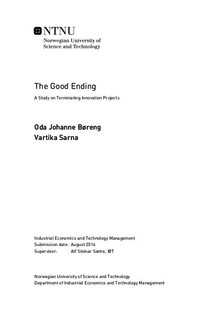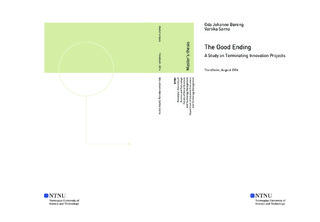| dc.description.abstract | The Good Ending investigates how different strategies for terminating an innovation project can affect proponents in various ways. Our research separates termination strategies in regard to how sensitive they are to sustain an individual s face . While a Face-Threatening Termination strategy belittles and disrespects the proponent, a Face-Supportive Termination strategy aims to uphold the proponent s dignity and pride. Our goal was to investigate how these two classifications differed in the effect they had on employees Mood, feeling of Psychological Safety, and Willingness to Innovate in the workplace after facing a project termination. In addition, we researched what role the level of Commitment, Resilience, Rejection Sensitivity, and Threat Sensitivity had for the impact of Face Messages on Mood, Psychological Safety, and Willingness to Innovate.
In collaboration with Professor John Daly and Professor Alf Steinar Saetre, we created a survey and distributed it to students in MSTC, MBA, and EMBA classes at University of Texas at Austin (UT). In total we received 215 valid responses. The data was analyzed using the software package IBM SPSS Statistics (SPSS) and an add-on macro named PROCESS. All data was manually transcribed into an excel-file and thereafter converted to SPSS. To be able to measure the effects of the given factors on an individual s Mood, Psychological Safety, and Willingness to Innovate, all variables were created by combining existing scales and adding relevant items to them. For instance, we applied the established scales by Woltin (2015) and Koopmann, Lanaj, Bono, and Campana (2016), Edmondson (1999), and Scott and Bruce (1994) in order to measure the outcome variables Mood, Psychological Safety, and Willingness to Innovate respectively. The validity of each of the resulting variables were checked by the use of reliability tests and comparing the resulting Cronbach s alpha to Nunnally (1978) s recommendation for a lower limit of 0.7.
Through our research we found that the direct effect of Face Messages on the outcome variables were significant. Face-Threatening Termination was found to have a significantly more negative impact on proponents Mood, Psychological Safety, and Willingness to Innovate than Face-Supportive Termination strategy. It was also found support for the hypothesis that people high in Commitment will experience a more negative Mood following a termination, than people low in Commitment. This was found to applicable to both a Face-Threatening and a Face-Supportive Termination. Additionally, Rejection Sensitivity was found to significantly moderate the impact of Face Messages on Mood and Psychological Safety. It was found that with high Rejection Sensitivity, Mood and Psychological Safety had a much lower score than for individuals with low Rejection Sensitivity. The moderation effect of Rejection Sensitivity was stronger in a Face-Supportive Termination strategy than a Face-Threatening Termination.
The other moderating variables were found to be nonsignificant, thus indicating that an idea proponent is in large affected by how the termination is conducted, independently of his or her commitment to the project and individual traits. Through these findings, this thesis emphasizes the importance of being aware of how the termination process impacts employee, and thereby the innovation climate. Having this knowledge is crucial for any successful manager. | |

